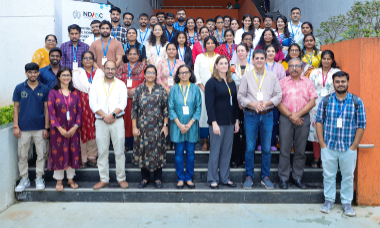
Events
Workshop on Core Modeling Frameworks and Open-Source Tools
September 23 - 24, 2025
A two-day workshop on “Core Modelling Frameworks and Open-Source Tools” was held during September 23 - 24, 2025.
The first day featured talks by NDMC faculty, researchers, and collaborators from partner institutes, while the second day included hands-on training sessions by a team from Institute for Disease Modelling (IDM), comprising Dr. Elisabeth Root, Deputy Director; Mr. Rajiv Sodhi, Deputy Director; Dr. Robyn Stuart, Consultant; and Dr. Savita Subramanian, Senior Research Scientist. The workshop was attended by a total of 36 research associates from NDMC and partner institutes; 52 % of the participants were women.
The first day of the workshop began with an introduction to the consortium’s activities by Prof. Sarika Mehra, Principal Investigator, NDMC, followed by a talk on “AI-based disease burden estimation approach” by Prof. Ganesh Ramakrishnan, Department of Computer Science and Engineering (CSE), IIT Bombay. The morning session featured a series of technical presentations, including “Fitting compartmental models for HPV and cervical cancer” by Prof. Ajit Rajwade, Department of CSE, IIT Bombay and Prof. Nirav Bhatt, IIT Madras, “An age-stratified mathematical model to inform optimal measles vaccination strategies” by Prof. Indrajit Ghosh, Bagchi School of Public Health, Ahmedabad University, “Modelling the impact of interventions on tuberculosis incidence and mortality” by Dr. Yashi Raj, Senior Project Research Scientist, NDMC, “Malaria risk mapping in India and its drivers” by Prof. Harish Phuleria, Department of Environmental Sciences and Engineering, and “Cost-effectiveness of whole genome sequencing–based surveillance in pandemics: An integrated operations and disease transmission modeling approach” by Prof. Sarang Deo, Indian School of Business.
In the afternoon, a thought-provoking panel discussion on “Breaking down silos: Shared challenges and solutions in public health modelling” was moderated by Prof. Saket Choudhary, Koita Centre for Digital Health, IIT Bombay, with Prof. Harish Phuleria, Prof. Mithun Mitra, Department of Physics, Dr. Robyn Stuart, Infectious Disease Modelling and Mr. Raghu Dharmaraju, CEO, ARTPARK as panelists. The day concluded with talks on “Economic modelling in public health research” by Dr. Susmita Chatterjee, The George Institute of Public Health, “Enabling disease modellers to minimize their impact” by Mr. Raghu Dharmaraju, ARTPARK, and “Overview of healthcare activities and initiatives at IIT Guwahati” by Prof. Parameswaran K. Iyer, Department of Chemistry, IIT Guwahati.
The second day focused on talks and hands-on sessions by the IDM team. Dr. Robyn Stuart and Dr. Elisabeth Root gave presentations on “Case studies: IDM software from code to policy”. This was followed by a talk on “Applied AI in Health” by Dr. Alpan Raval, Chief Scientist at Wadhwani AI. Dr. Stuart then led a session on “Under the hood: Model architecture”, providing deeper insights into IDM’s modelling frameworks, and in the afternoon, she conducted “Deep dive: A tour of Starsim”, giving participants hands-on understanding of the tool. The day concluded with interactive discussions that fostered exchange of ideas and reflections on the training.
The workshop was well received by the participants. A post workshop survey indicated that the participants found the difficulty level of the hands-on sessions to be on par with expectations and the talks, informative and helpful in modelling. Here is what some of them had to say-
“Great workshop! Excellent sessions from guest speakers and IDM - I learned a lot about agent-based modelling and appreciated the computational talk that linked epidemiology with computational biology, which paves the path to prevent the disease” - Hariprasad, ICAR-NIVEDI.
“Talk on agent based model and hands-on session was informative. It will help me in the future if I use agent based models.” - Shoummo Sen Gupta, KCDH.
“The workshop was very helpful for me. I learned several new things, especially from the economics point of view, which added valuable insights to my understanding.”- Dr. Divya Arumugam, VIT-Chennai.
Overall, the workshop provided a comprehensive blend of technical presentations, hands-on training, and interactive discussions, enhancing participants’ understanding of core modelling frameworks and open-source tools in public health research.
